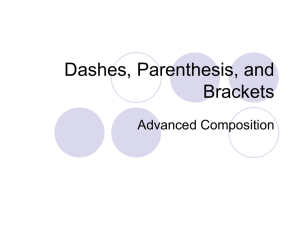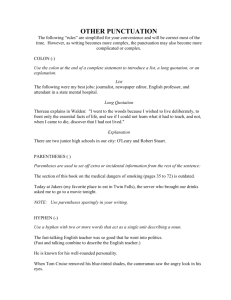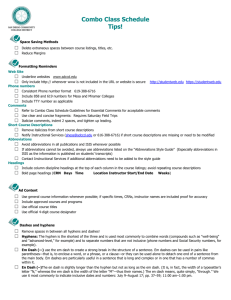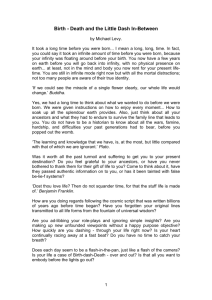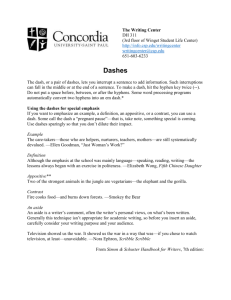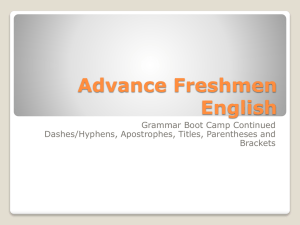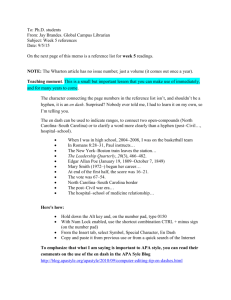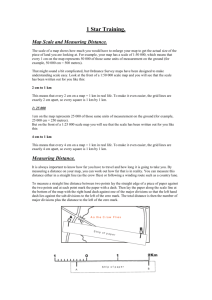How to Use the Dash!
advertisement
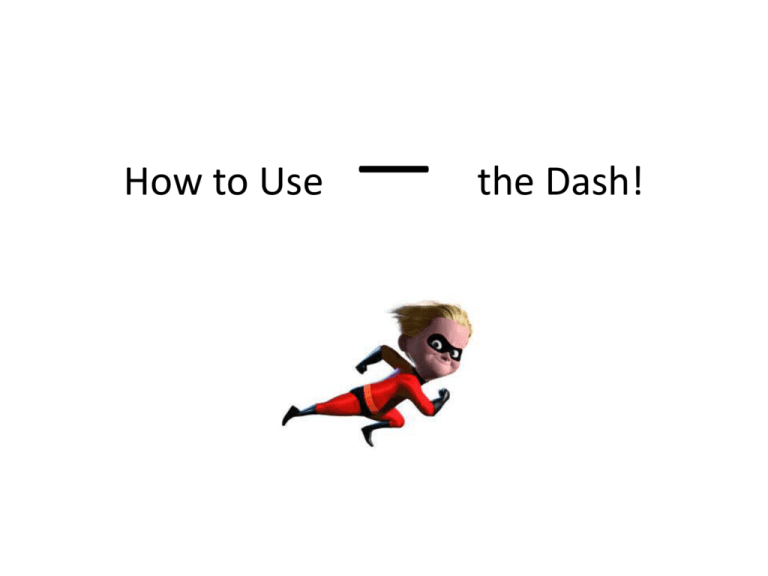
How to Use — the Dash! Know the kinds of dashes • A dash is noticeably longer than a hyphen. There are several different dashes, but the most commonly used are the en dash (–) and the em dash (—). They are so named because they are the same width as the small letter n and capital letter M, respectively. Kinds of dashes – The figure dash is a special typographical character most often used in phone numbers. Since it's normally unavailable in word processing, you can simply use a hyphen. (Example: 408‒555‒6792, or use 408-555-6792.) – An en dash (–) is most commonly used to indicate a range of numbers. It is longer than a hyphen although a hyphen with spaces surrounding it can be used if a dash is not available. In Microsoft Word, doing this will automatically change the hyphen into an en dash. (Example: August 13–August 18, or pages 29–349. Note that there should be no space around the en dash.) – An em dash is most often used to indicate a break in thought or to set an appositive off from the rest of the sentence. It can also be used to show a date when the time frame in question has not yet ended (Example: John Smith, 1976—). The en dash • An en dash, roughly the width of an n, is a little longer than a hyphen. It is used for periods of time when you might otherwise use to. – Examples: • The years 2001–2003 • January–June • An en dash is also used in place of a hyphen when combining open compounds. – Examples: • North Carolina–Virginia border • a high school–college conference The em dash • The remainder of this presentation will deal with usage of the em dash Identify an independent clause • Before you begin using an em dash in a sentence, you must know what an independent clause is. An independent clause is one that can stand on its own because it contains both a subject and a verb and expresses a complete thought. For example: – I love pizza. – My mom makes me dinner. Use the em dash • Understanding how to identify an independent clause, you're ready to begin using a dash. – Most commonly, a dash connects an independent clause with another, with a separate or interrupting thought plus a conjunction like or, but, yet, as, for, and after the second dash. Use the em dash – The dash works somewhat like parentheses or commas, but it is used where a stronger punctuation is needed. It can connect an independent clause with the 'interrupting' thought, like so: • Independent clause—thought—independent clause. – I'd better have passed my test—it's ninety percent of my class grade—or I'll have to go to summer school. – Well, I passed the test—granted, I cheated—but I passed! Use the em dash – Or like so: • Independent clause—thought. – Abby gave me a terrible haircut—and she expected a tip! Know other ways to use a dash • Dashes are also used to offset lists placed in the middle of an independent clause, where commas are already used, for example: – All of my school work—physics, Academic Decathlon, sociology, and calculus—got washed away when my house was flooded. Other ways to use a dash • Note: If there is only one appositive (which renames a noun), then you should set that off with commas, not dashes, for example: – The best waiter, Alain, can speak three languages. Other ways to use a dash • In dialogue, dashes are used to indicate interrupted speech. – "But I—But you said— ... wait, what?" stammered Edna. • Dashes can also be used to emphasize a sentence part. – Of course, I'll sign a prenuptial agreement—as long as it's in my favor. How to type a dash • When using a word processor, such as Microsoft Word, type two hyphens in between the words you wish to separate, leaving no spaces in between the words and the hyphens. The processor will automatically change the two hyphens into an em dash. (s—s) • If you use a space after the first word and before the second word, the processor will change the two hyphens into an en dash. (s – s) More Examples • Wrong: We saw two movies at the theater today—but I didn’t really like either of them—. • Right: We saw two movies at the theater today—but I didn’t really like either of them. • Wrong: My best friend—Sam—went to the doctor with me today. • Right use of commas: My best friend, Sam, went to the doctor with me today. • Right use of the dash: Sam—even though she fears clinics terribly—went to the doctor with me today. • Note: The last example using 'Sam' is not an appositive; the set-off item is a subordinate clause. Tips • Use dashes instead of parentheses when the note you are making is more connected to the initial sentence, as parentheses usually indicate a more separate or personal thought. Use dashes, instead of commas, when the note breaks up the flow of a sentence, as commas are typically used for an item that fits in more. • When using a dash—in terms of explanations or listings—in a formal paper, it is recommended to rearrange the sentence so that a colon could be used instead; dashes tend to interrupt the sentence, which is not the desired tone of a formal paper. Warnings! • Dashes are not to be used commonly. If your paper has a whole bunch of dashes, make sure to check them over and see whether or not they all were used correctly and appropriately. • If you have a dash where a comma would work, use the comma! • If you use a dash toward the end of a sentence, do not put an ending dash right before the period. • Do not replace commas that are being used for an appositive with dashes. Simply because it’s an interruption, doesn’t mean a dash belongs there. Further warnings • In informal writing, em dashes may replace commas, semicolons, colons, and parentheses to indicate added emphasis, an interruption, or an abrupt change of thought. BUT use an em dash sparingly in formal writing. – Examples: • You are the friend—the only friend—who offered to help me. • Never have I met such a lovely person—before you. • I pay the bills—she has all the fun. A semicolon would be used here in formal writing. Examples (continued) • I need three items at the store—dog food, vegetarian chili, and cheddar cheese. Remember, a colon would be used here in formal writing. • My agreement with Fiona is clear—she teaches me French and I teach her German. Again, a colon would work here in formal writing. • Please call my agent—Jessica Cohen—about hiring me. Parentheses or commas would work just fine here instead of the dashes. • I wish you would—oh, never mind. This shows an abrupt change in thought and warrants an em dash. Sources & Citations My Primary Source Citation: “Use a Dash in an English Sentence.” wikiHow. 27 July 2011. Web. 24 Sep 2011. <http://www.wikihow.com/Use-a-Dash-in-an-English-Sentence>. My Secondary Source Citation: Straus, Jane. “Dashes.” Grammarbook.com. 2011. Web. 24 Sep 2011. <http://www.grammarbook.com/punctuation/dashes.asp>. wikiHow used the following sources: “Brief Overview of Punctuation: Semicolon, Colon, Parenthesis, Dash, Quotations, and Italics”. The OWL at Purdue. 2007. The Writing Lab, the OWL at Purdue, and Purdue University. 3 Sept 2007 <http://owl.english.purdue.edu/handouts/grammar/g_overvw.html>. Hoyt, Robert R., ed. Holt Handbook: Sixth Addition. Austin: Holt, Rinehart and Winston. 2003. “Independent Clause”. Wikipedia: The Free Encyclopedia. 11 May 2007. Wikimedia Foundation, Inc. 3 Sept 2007 <http://en.wikipedia.org/wiki/independent_clause>. “The Dash”. The Guide to Grammar and Writing. 2004. Capital Community College Foundation. 1 Sept. 2007 <http://grammar.ccc.commnet.edu/grammar/marks/dash.htm>.
